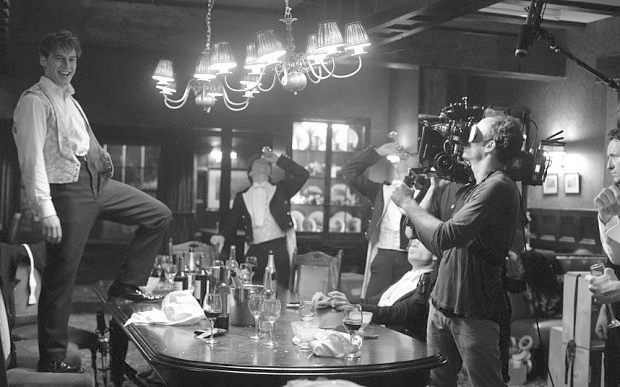By Pete Barell
Arts & Entertainment Editor
“The Riot Club” begins with a smashing prologue; quite literally. In the 17th century, we observe the rise of a hedonistic social club at Oxford University, named after a promiscuous and glass-smashing student who was murdered by the husband of a lover. They’re like an old school “Animal House,” priding themselves on an apparent intellectual superiority, while simultaneously taking part in party-boy antics. The club feeds on its elitism, with all of the members descendants of the rich, posh socialites of England.

Photo: telegraph.co.uk
Adapted from the play “Posh” by Laura Wade, and directed by Lone Scherfig (“An Education”), “The Riot Club” is like “Project X” crossed with an English historical drama, hinting faintly at the bigotry of the one percent while providing visual thrills sure to satiate the modern, maybe attention-lacking, viewer.
The film jumps forward to modern times, where the long-lived club is attempting to recruit some new, first year chaps into their cliquey circle. Miles (Max Irons, son of Jeremy Irons) is a bookish good-boy, our everyman, who almost immediately clashes with Alistair (Sam Claflin) as they argue about politics and economy. Yes, the film is filled with this mix of intelligent talk one moment, smashing liquor bottles and getting into brawls the next.
A ceremonial hazing begins, where we meet the womanizing Harry (Douglas Booth) and other equally quirky characters. The issue of class is examined as Lauren (Holliday Grainger) begins a relationship with Miles, and we glean at the divide between the entitled upper crust and their apparent underlings in society. Much of the film gives the appearance of a world building exercise, leading up to a climactic supper scene towards the end, where the club meets at a rural pub for a lavish meal and personalities diverge. The bubble that is formed by the ten men in the club begins to burst into a fit of violence, and the audience may be delighted to see these egoists unravel a bit.
This is an ensemble film, as each character as a group is given attention. The titular club itself is the driving force of the story – just another chapter of their history. It is in their mistakes as people that we learn that an academic perspective cannot be easily applied to the problems of life itself. Books can’t always match the teaching in overcoming a difficult experience, and our Riot Club boys are not as smart as they think they are.
While “The Riot Club” has its share of interestingly dark melo-drama, its portrayal of posh-society-gone-wild is ultimately unremarkable and overcooked. The film seems on the verge of fulfilling its root in social satire, yet lacking a clear route to being insightful in that way – there is a sense of incompletion. This is not helped by a lack of subtlety, especially in the emphasis on the arrogant elitism of its characters.
“The Riot Club” is released theatrically and on video-on-demand March 27 by IFC Films. It first premiered at the 2014 Toronto Film Festival.



Be First to Comment